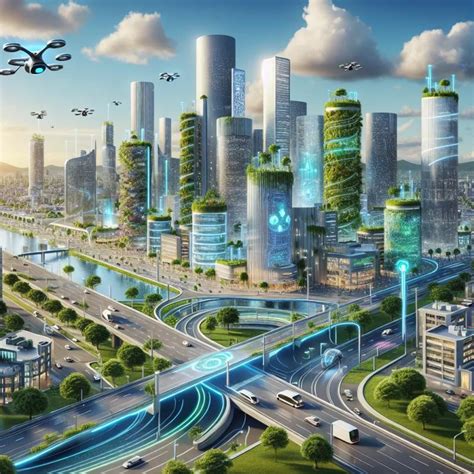Street technology, also known as street tech, refers to the innovative use of technology to improve the daily lives of people living in urban areas. From smart traffic management to intelligent waste management, street tech is transforming the way cities operate and interact with their citizens. In this article, we will explore five ways street tech is revolutionizing urban living.
Urbanization is on the rise, with more and more people moving to cities in search of better economic opportunities, education, and healthcare. However, this rapid urbanization has put a strain on city infrastructure, leading to issues such as traffic congestion, pollution, and inadequate public services. Street tech is a vital tool in addressing these challenges and creating more sustainable, efficient, and livable cities.
1. Smart Traffic Management

One of the most significant contributions of street tech is smart traffic management. Traditional traffic management systems rely on manual monitoring and response, which can be time-consuming and inefficient. Smart traffic management systems, on the other hand, use real-time data and analytics to optimize traffic flow, reduce congestion, and minimize travel times.
These systems use a combination of sensors, cameras, and software to monitor traffic conditions in real-time, providing city officials with valuable insights to make data-driven decisions. For example, smart traffic signals can adjust their timing based on traffic volume, pedestrian traffic, and other factors to minimize congestion and reduce travel times.
Benefits of Smart Traffic Management
- Reduced traffic congestion
- Minimized travel times
- Improved air quality
- Enhanced public safety
- Increased efficiency in traffic management
2. Intelligent Waste Management

Intelligent waste management is another area where street tech is making a significant impact. Traditional waste management systems rely on manual collection and disposal, which can be inefficient and costly. Intelligent waste management systems, on the other hand, use sensors and data analytics to optimize waste collection, reduce waste disposal costs, and promote sustainability.
These systems use sensors to monitor waste levels in real-time, providing waste management officials with valuable insights to optimize collection routes and schedules. For example, smart waste bins can alert waste management officials when they need to be emptied, reducing the need for unnecessary collections and minimizing waste disposal costs.
Benefits of Intelligent Waste Management
- Reduced waste disposal costs
- Minimized environmental impact
- Improved public health and safety
- Increased efficiency in waste management
- Promotes sustainability
3. Smart Lighting

Smart lighting is another area where street tech is making a significant impact. Traditional lighting systems rely on manual monitoring and maintenance, which can be time-consuming and costly. Smart lighting systems, on the other hand, use sensors and data analytics to optimize lighting levels, reduce energy consumption, and promote public safety.
These systems use sensors to monitor lighting levels in real-time, providing city officials with valuable insights to optimize lighting levels and reduce energy consumption. For example, smart streetlights can adjust their brightness based on natural light levels, reducing energy consumption and promoting public safety.
Benefits of Smart Lighting
- Reduced energy consumption
- Minimized environmental impact
- Improved public safety
- Increased efficiency in lighting management
- Promotes sustainability
4. Public Wi-Fi

Public Wi-Fi is another area where street tech is making a significant impact. Traditional internet access relies on private networks and hotspots, which can be expensive and limited. Public Wi-Fi, on the other hand, provides citizens with free and accessible internet access, promoting digital inclusion and economic development.
These systems use wireless routers and antennas to provide citizens with free and accessible internet access. For example, smart cities can provide public Wi-Fi in public spaces, such as parks, plazas, and public transportation, promoting digital inclusion and economic development.
Benefits of Public Wi-Fi
- Promotes digital inclusion
- Increases economic development
- Improves public services
- Enhances citizen engagement
- Increases efficiency in public services
5. Smart Public Transportation

Smart public transportation is another area where street tech is making a significant impact. Traditional public transportation systems rely on manual monitoring and maintenance, which can be time-consuming and costly. Smart public transportation systems, on the other hand, use sensors and data analytics to optimize routes, reduce travel times, and promote sustainability.
These systems use sensors and data analytics to monitor public transportation in real-time, providing city officials with valuable insights to optimize routes and reduce travel times. For example, smart buses can adjust their routes based on traffic conditions, reducing travel times and promoting sustainability.
Benefits of Smart Public Transportation
- Reduced travel times
- Minimized environmental impact
- Improved public safety
- Increased efficiency in public transportation
- Promotes sustainability
Gallery of Street Tech






In conclusion, street tech is revolutionizing urban living by providing cities with innovative solutions to address their most pressing challenges. From smart traffic management to intelligent waste management, street tech is improving the daily lives of citizens and promoting sustainability. As cities continue to grow and evolve, it is essential to invest in street tech to create more efficient, sustainable, and livable cities.
We hope you found this article informative and engaging. If you have any questions or comments, please feel free to share them below. Let's continue the conversation on how street tech is transforming urban living.
What is street tech?
+Street tech refers to the innovative use of technology to improve the daily lives of people living in urban areas.
How does smart traffic management work?
+Smart traffic management systems use sensors and data analytics to optimize traffic flow, reduce congestion, and minimize travel times.
What are the benefits of intelligent waste management?
+Intelligent waste management systems reduce waste disposal costs, minimize environmental impact, and promote sustainability.
